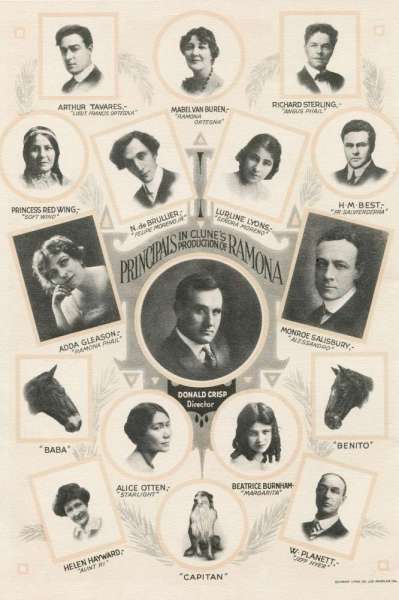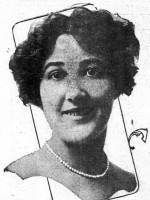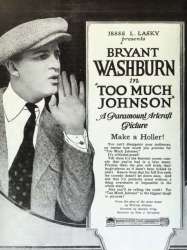Ramona is a american film directed by Donald Crisp released in USA on 5 april 1916 with Mabel Van Buren
Ramona (1916)

If you like this film, let us know!
Ramona is a 1916 American drama film directed by Donald Crisp, based on Helen Hunt Jackson's 1884 novel Ramona. The film is considered to be lost with only reel 5 preserved at the Library of Congress.
The New York Times commended it for "excellent photography, a wealth of picturesque and carefully considered detail, good work by a multitudinous company," but complained that "no very stirring scenario was inspired by the long, uneventful stretches of the novel."
Actors

Mabel Van Buren
(Ramona Gonzaga - Sister of Señora Moreno)

Adda Gleason
(Ramona Phail - Daughter of Angus Phail)

Ann Dvorak
(Ramona Phail (age 4))

Nigel De Brulier
(Felipe Moreno)

Monroe Salisbury
(Alessandro Assis - Son of Chief Pablo Assis)
Comments
Leave comment :
Suggestions of similar film to Ramona
There are 141 films with the same actors, 44 films with the same director, to have finally 70 suggestions of similar films.If you liked Ramona, you will probably like those similar films :

The Barbarian (1921)
Directed by Donald Crisp
Origin USA
Genres Drama
Actors Monroe Salisbury, George Berrell, J. Barney Sherry, Jane Novak, Alan Hale, Lillian Leighton
Rating52%





The film is about Eric Straive, an educated man raised in the Canadian wilderness, who is subjected to the evils of Capitalism and greed when James Heatherton seeks to acquire the Straive estate.

The Countess Charming (1917)
, 50minutesDirected by Donald Crisp
Origin USA
Genres Comedy
Actors Julian Eltinge, Florence Vidor, Tully Marshall, George Kuwa, Edythe Chapman, Mabel Van Buren
As described in a film magazine, upon insulting the Vandergrafts, leaders of the North Shore Club, Stanley Jordan (Eltinge) is forced out of society. Determined to be near his sweetheart Betty (Vidor), he becomes the Countess Raffelski. He takes the North Shore colony by storm. At many of the social functions valuables have been stolen and the guilty person cannot be found. Suspicion is thrown upon the countess and, to escape all, Stanley spreads the rumor that the countess is dead. He wins Betty and with the money from the stolen jewels he is able to make a large contribution to the Red Cross fund.

The Bond Between (1917)
, 50minutesDirected by Donald Crisp
Origin USA
Genres Drama
Actors Nigel De Brulier, Paul Weigel, George Beban, John Burton, Eugene Pallette, Vola Vale

The Cook of Canyon Camp (1917)
, 50minutesDirected by Donald Crisp
Origin USA
Actors George Beban, Monroe Salisbury, Florence Vidor, Helen Jerome Eddy

A Roadside Impresario (1917)
, 50minutesDirected by Donald Crisp
Origin USA
Actors Julia Faye, Harry De Vere, Harrison Ford, Fred Huntley

Too Much Johnson (1919)
Directed by Donald Crisp
Origin USA
Genres Comedy
Themes Films based on plays
Actors Bryant Washburn, Lois Wilson, Adele Farrington, Monte Blue, Clarence Geldart, Gloria Hope

Vanity (1927)
, 1hDirected by Donald Crisp, Emile de Ruelle
Origin USA
Genres Drama
Actors Leatrice Joy, Charles Ray, Alan Hale, Mayme Kelso, Noble Johnson, Louis Payne
Rating22%






Believe Me, Xantippe (1918)
, 50minutesDirected by Donald Crisp
Origin USA
Genres Comedy, Romantic comedy, Romance
Themes Films based on plays
Actors Wallace Reid, Ann Little, Ernest Joy, Noah Beery Sr., James Cruze, Winifred Greenwood

The Runaway Bride (1930)
, 1h9Directed by Donald Crisp, James Anderson
Origin USA
Genres Drama, Crime
Themes Films based on plays
Actors Mary Astor, Lloyd Hughes, Paul Hurst, David Newell, Natalie Moorhead, Francis McDonald
Rating49%





Mary Gray (Mary Astor) and Dick Mercer (David Newell) are racing to Atlantic City, where they intend to elope, since Mary's wealthy parents would never approve of the marriage. In Atlantic City, they arrive at the humble efficiency hotel room Mary has rented. Dick is not impressed, and would prefer they stay in a fancier hotel. An argument ensues, ending with Dick storming out, leaving Mary alone.

The Cop (1928)
, 1h17Directed by Donald Crisp
Origin USA
Genres Drama
Actors William Boyd, Louis Natheaux, Alan Hale, Jacqueline Logan, Robert Armstrong, Tom Kennedy
Rating65%





 Connection
Connection